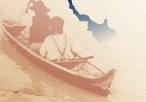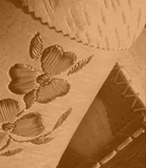Dogrib elders vividly remember stories about the construction and use of birchbark
canoes. An elder in Rae Lakes, Marie Mantla, recalled one such story. In the
fall of 1939, after spending the summer fishing and attending treaty celebrations
at Rae, Mrs. Mantla, her husband, father, and younger brother Harry Simpson,
began travelling north on the trail to Hottah Lake to spend the winter, trapping
and hunting. Travelling in two birchbark canoes that her father had constructed
the previous spring, the party reached Bea Lake as the ice began forming on
the lake. Caching the canoes for the winter, the party waited for enough snow
to continue the trip by dog team.
In recounting the story, Mrs. Mantla noted the two birchbark canoes were the
last ones her father constructed. The following spring he opted for cedar/canvas
canoes from the Hudson's Bay Company at Rae. During her story, Mrs. Mantla mentioned
that on the trip north to Hottah Lake, they stopped at a portage just south
of Bea Lake. Here they collected a length of birchbark to repair one of the
canoes. Mrs. Mantla noted that the scarred birch tree was still living the last
time she had seen it, twenty years later. At the end of her story Mrs. Mantla
asked if the archaeologists interviewing her would search for the canoes and
the birch tree. Fortunately, Mrs. Mantla's description of the site provided
enough detail that they were able to locate both the remains of the two canoes,
and the scarred tree. Remarkably, the birch tree was still living and clearly
showed the scar left in the fall of 1939.

